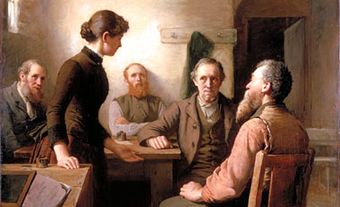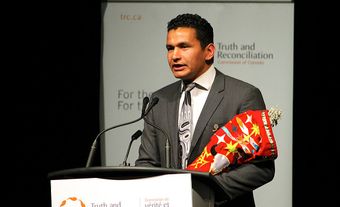Georges-Henri Lévesque
Georges-Henri Lévesque, priest, sociologist, administrator (born 16 February 1903 in Roberval, QC; died 15 January 2000). After studying at the Dominican College in Ottawa and Université de Lille, France, he taught at the College as well as at Université de Montréal and Laval. In 1938 he organized the School of Social Sciences at Laval, which became a full-fledged faculty in 1943, and was its dean until 1955. He was the founder, director and modernizer of Quebec's cooperative movement (1945-60). As well he was the creator and administrator of the Dominican Order's Maison Montmorency (1955-63). It served as a gathering place for hundreds of religious retreats and secular conferences during which old and new ideas and ideologies were debated and freedom of expression was enhanced in an otherwise closed society. Despite the fact that he rejected the state-centred Québécois nationalism of the 1960s, Father Lévesque's many contributions to the creation of modern Quebec promoted him into the illustrious pantheon of the fathers of Quebec's Quiet Revolution.
A fervent liberal Catholic, committed Christian humanist, avowed internationalist, and a social democrat, he worked hard to free the Catholic Church from the shackles of French-Canadian nationalism. He used his position, as well as the Faculty of Social Sciences, to create new socioeconomic institutions such as the Conseil supérieur de la coopération and the Société d'éducation des adultes, and to initiate the modernization of Quebec's church-controlled social welfare organizations. The faculty was also responsible for producing the first generation of university-educated labour organizers. During the 1950s and 1960s these groups contributed immensely to the democratization of organized labour and the modernization of social and health organizations. His liberal ideas, combined with his pan-Canadian and internationalist outlook, brought him into conflict with Quebec's intensely conservative clerical and political elites, especially Premier Maurice Duplessis. With the support of his Dominican order and his numerous friends inside and outside the university, he was able to weather several attempts to undermine his career and destroy the faculty.
In the early 1950s he was a member of the Royal Commission on National Development in the Arts, Letters and Sciences, chaired by Vincent Massey, which recommended federal grants to universities and the creation of the Canada Council for the Arts. For supporting these innovations he suffered the wrath of the traditional French-Canadian nationalists and the emerging neo-nationalists. He was not deterred, because he believed that the lucid and democratic integration of a modern francophone Quebec society into Confederation was the best way to guarantee its survival and expansion well into the next century. He served as vice-president of the Canada Council (1957-62), the Association canadienne-française pour l'avancement des sciences and the Royal Society of Canada (1962-63). Between 1954 and 1963 he acted as the director of Maison Montmorency near Quebec City, a centre of social, cultural and religious debate and activism. He helped create a faculty of social sciences at Salamanaca, Spain, and was the founder and first rector of the National University of Rwanda in Central Africa (1963-72).
He has been a lifelong member of numerous international organizations and has been awarded honorary degrees from over a dozen universities. He received the prestigious Canada Council Molson Prize (1966) as well as the Royal Bank Award (1982), the Pearson medal for peace (1983), and, most recently, the Fondation Édouard-Montpetit Medal (1986). He was made a Companion of the Order of Canada in 1979 and an Officer of the Ordre nationale du Québec in 1985. Lévesque's contribution to a more humane, more democratic Canadian society has been immeasurable.

 Share on Facebook
Share on Facebook Share on X
Share on X Share by Email
Share by Email Share on Google Classroom
Share on Google Classroom


